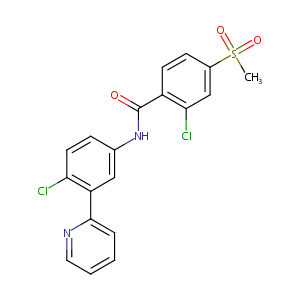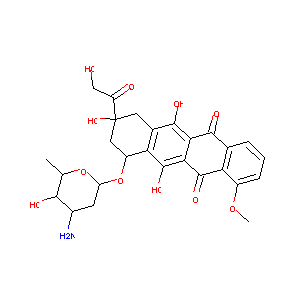| 1 |
Loss of function mutations in VARS encoding cytoplasmic valyl-tRNA synthetase cause microcephaly, seizures, and progressive cerebral atrophy.Hum Genet. 2018 Apr;137(4):293-303. doi: 10.1007/s00439-018-1882-3. Epub 2018 Apr 24.
|
| 2 |
URL: http://www.guidetopharmacology.org Nucleic Acids Res. 2015 Oct 12. pii: gkv1037. The IUPHAR/BPS Guide to PHARMACOLOGY in 2016: towards curated quantitative interactions between 1300 protein targets and 6000 ligands. (Ligand id: 6975).
|
| 3 |
A phase II, multicenter, open-label, 3-cohort trial evaluating the efficacy and safety of vismodegib in operable basal cell carcinoma. J Am Acad Dermatol. 2015 Jul;73(1):99-105.e1.
|
| 4 |
New drugs for the treatment of cancer, 1990-2001. Isr Med Assoc J. 2002 Dec;4(12):1124-31.
|
| 5 |
Nat Rev Drug Discov. 2013 Feb;12(2):87-90.
|
| 6 |
The dawn of hedgehog inhibitors: Vismodegib. J Pharmacol Pharmacother. 2013 Jan;4(1):4-7.
|
| 7 |
Hedgehog signaling antagonist GDC-0449 (Vismodegib) inhibits pancreatic cancer stem cell characteristics: molecular mechanisms. PLoS One. 2011;6(11):e27306. doi: 10.1371/journal.pone.0027306. Epub 2011 Nov 8.
|
| 8 |
Epigenetic targeting of Hedgehog pathway transcriptional output through BET bromodomain inhibition. Nat Med. 2014 Jul;20(7):732-40. doi: 10.1038/nm.3613. Epub 2014 Jun 29.
|
| 9 |
Drugs@FDA. U.S. Food and Drug Administration. U.S. Department of Health & Human Services.
|
| 10 |
Sulindac sulfide selectively increases sensitivity of ABCC1 expressing tumor cells to doxorubicin and glutathione depletion. J Biomed Res. 2016 Mar;30(2):120-133.
|
| 11 |
Mammalian drug efflux transporters of the ATP binding cassette (ABC) family in multidrug resistance: A review of the past decade. Cancer Lett. 2016 Jan 1;370(1):153-64.
|
| 12 |
Epirubicin glucuronidation and UGT2B7 developmental expression. Drug Metab Dispos. 2006 Dec;34(12):2097-101.
|
| 13 |
Co-encapsulation of chrysophsin-1 and epirubicin in PEGylated liposomes circumvents multidrug resistance in HeLa cells. Chem Biol Interact. 2015 Dec 5;242:13-23. doi: 10.1016/j.cbi.2015.08.023. Epub 2015 Sep 1.
|
| 14 |
Camptothecin resistance: role of the ATP-binding cassette (ABC), mitoxantrone-resistance half-transporter (MXR), and potential for glucuronidation in MXR-expressing cells. Cancer Res. 1999 Dec 1;59(23):5938-46.
|
| 15 |
Preliminary study on behaviour of atrial natriuretic factor in anthracycline-related cardiac toxicity. Int J Clin Pharmacol Res. 1991;11(2):75-81.
|
| 16 |
7,3',4'-Trihydroxyisoflavone modulates multidrug resistance transporters and induces apoptosis via production of reactive oxygen species. Toxicology. 2012 Dec 16;302(2-3):221-32. doi: 10.1016/j.tox.2012.08.003. Epub 2012 Aug 15.
|
| 17 |
Early epirubicin-induced myocardial dysfunction revealed by serial tissue Doppler echocardiography: correlation with inflammatory and oxidative stress markers. Oncologist. 2007 Sep;12(9):1124-33. doi: 10.1634/theoncologist.12-9-1124.
|
| 18 |
Persistence, up to 18 months of follow-up, of epirubicin-induced myocardial dysfunction detected early by serial tissue Doppler echocardiography: correlation with inflammatory and oxidative stress markers. Oncologist. 2008 Dec;13(12):1296-305. doi: 10.1634/theoncologist.2008-0151. Epub 2008 Dec 5.
|
| 19 |
Evidence for direct involvement of epirubicin in the formation of chromosomal translocations in t(15;17) therapy-related acute promyelocytic leukemia. Blood. 2010 Jan 14;115(2):326-30. doi: 10.1182/blood-2009-07-235051. Epub 2009 Nov 2.
|
| 20 |
(-)-Gossypol enhances the anticancer activity of epirubicin via downregulating survivin in hepatocellular carcinoma. Chem Biol Interact. 2022 Sep 1;364:110060. doi: 10.1016/j.cbi.2022.110060. Epub 2022 Jul 22.
|
| 21 |
The differential effects of cyclophosphamide, epirubicin and 5-fluorouracil on apoptotic marker (CPP-32), pro-apoptotic protein (p21(WAF-1)) and anti-apoptotic protein (bcl-2) in breast cancer cells. Breast Cancer Res Treat. 2003 Aug;80(3):239-44. doi: 10.1023/A:1024995202135.
|
| 22 |
Genome-wide association study of chemotherapeutic agent-induced severe neutropenia/leucopenia for patients in Biobank Japan. Cancer Sci. 2013 Aug;104(8):1074-82. doi: 10.1111/cas.12186. Epub 2013 Jun 10.
|
| 23 |
MARVELD1 attenuates arsenic trioxide-induced apoptosis in liver cancer cells by inhibiting reactive oxygen species production. Ann Transl Med. 2019 May;7(9):200. doi: 10.21037/atm.2019.04.38.
|
| 24 |
Genome-wide association study of epirubicin-induced leukopenia in Japanese patients. Pharmacogenet Genomics. 2011 Sep;21(9):552-8. doi: 10.1097/FPC.0b013e328348e48f.
|
| 25 |
[Knock-down of apollon gene by antisense oligodeoxynucleotide inhibits the proliferation of Lovo cells and enhances chemo-sensitivity]. Yao Xue Xue Bao. 2011 Feb;46(2):138-45.
|
| 26 |
[Antisense oligonucleotide targeting survivin induces apoptosis of renal clear-cell carcinoma cells and enhances their sensitivity to epirubicin in vitro]. Zhonghua Zhong Liu Za Zhi. 2005 Aug;27(8):468-70.
|
| 27 |
Endogenous antioxidant enzymes and glutathione S-transferase in protection of mesothelioma cells against hydrogen peroxide and epirubicin toxicity. Br J Cancer. 1998 Apr;77(7):1097-102. doi: 10.1038/bjc.1998.182.
|
| 28 |
S100P contributes to chemosensitivity of human ovarian cancer cell line OVCAR3. Oncol Rep. 2008 Aug;20(2):325-32.
|
| 29 |
TSSC3 overexpression associates with growth inhibition, apoptosis induction and enhances chemotherapeutic effects in human osteosarcoma. Carcinogenesis. 2012 Jan;33(1):30-40. doi: 10.1093/carcin/bgr232. Epub 2011 Oct 21.
|
| 30 |
Biologically active neutrophil chemokine pattern in tonsillitis.Clin Exp Immunol. 2004 Mar;135(3):511-8. doi: 10.1111/j.1365-2249.2003.02390.x.
|
|
|
|
|
|
|


